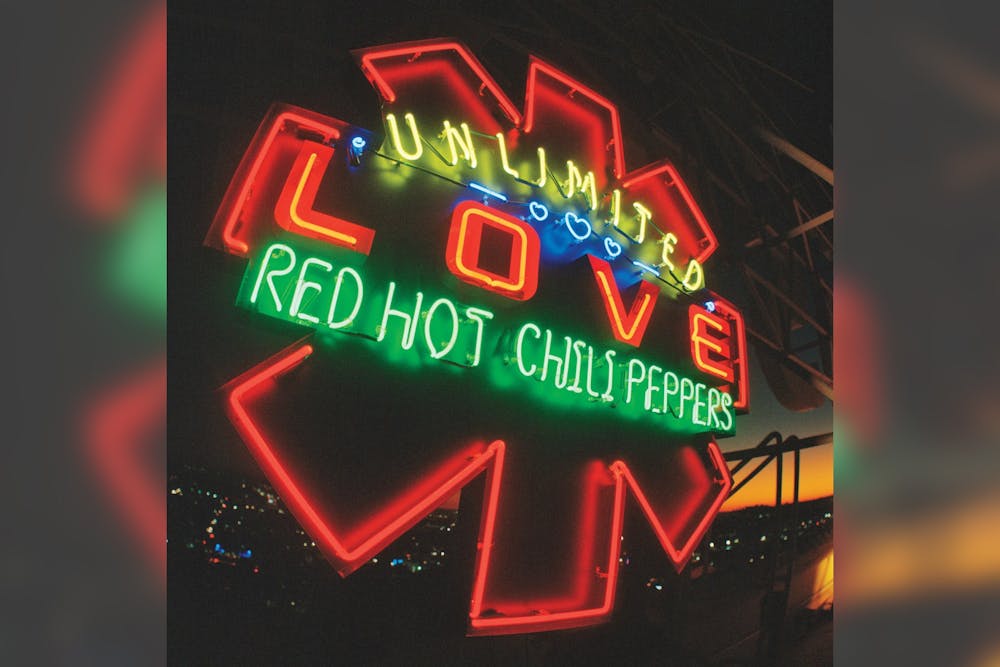“Unlimited Love” is a facet of reflection for the Red Hot Chili Peppers as they revisit funky melodies and alternative rock after a six year hiatus.
The band’s return to rock feels familiar, as they reunite with prodigal guitarist John Frusciante for the first time since the release of their “Stadium Arcadium” album in 2006. Fans will rejoice as the musician’s smooth blend of staccato licks and percussive chord progressions accompany sharp production from studio legend Rick Rubin on this newest album.
Although “Unlimited Love” is refreshingly raw and packed with strong musicianship, it also confirms that the rockers' best years are behind them. Despite an influx of carefully crafted lyrics, the Red Hot Chili Peppers fail to offer listeners anything new.
The opening track is sophisticated in its lyrical commentary on Australia’s devastating bushfires in 2019 and 2020. An alluring guitar riff from Frusciante invites listeners in and covers “Black Summer” in a melancholic haze before frontman Anthony Kiedis intensifies the track with his thrashing voice.
On “Here Ever After,” Kiedis returns to his original, rap-style delivery of lyrics to tell the story of a toxic relationship. While it’s clear that Kiedis hasn’t lost his energetic spunk, it’d be a far more compelling track if he debuted a sense of maturity through his ballad-built vocals instead.
The bass-driven chorus of “Aquatic Mouth Dance” is littered with references to the early days of the Red Hot Chili Peppers, as the title mimics the title for track “American Ghost Dance” from the band’s second album “Freaky Styley.”
Within the first half of the album, it is clear that “Unlimited Love” revisits the past and reflects on the band’s journey as a whole. This decision is purposeful, as it gives the Red Hot Chili Peppers a space to express themselves and revive a decades-long career. With no musical evolution, however, the album is forgettable.
In spite of this repetitive nature, the Red Hot Chili Peppers also exhibit a surprising amount of rare instrumentation throughout the album. On “Not The One,” Kiedis sings about feeling unworthy in romantic relationships over a gentle piano melody.
As the album progresses, the Red Hot Chili Peppers remain true to themselves. The musicians refuse to shy away from their funk-infused alternative rock that serves as a touchstone for modern rock sensibilities.
The band thrives with lyrical absurdity on “Poster Child.” Juxtapositions of unusual pop culture figures perfectly match the song’s groovy rhythm as Kiedis raps, “Adam Ant and Robert Plant, the banter of a sycophant, enlisted by Ulysses Grant to record at the Record Plant.”
On later track “Let ‘Em Cry,” percussionist Chad Smith’s beautiful drum pattern compliments an infectious chorus as a series of horns encourage listeners to dance.
Related: [COLUMN: Beach House’s ‘Once Twice Melody’ is an atmospheric reverie of dream pop noise]
The album nears its end with “The Heavy Wing.” On this track, Frusciante graces listeners with a driving guitar riff that precedes verses in which Kiedis showcases his baritone voice, as he sings, “Trace me now through your innocence, tell me it's part of the program I started.”
On “Tangelo,” slowed down acoustics bring the album to a close with despondent lyrics that are vulnerable, but overdone on previous albums from the Red Hot Chili Peppers.
While “Unlimited Love” stands as a sentimental album for longterm fans of the once-radical rock band, the Red Hot Chili Peppers fail to reinvent themselves with a repetitive feeling of nonchalance on this latest album.




